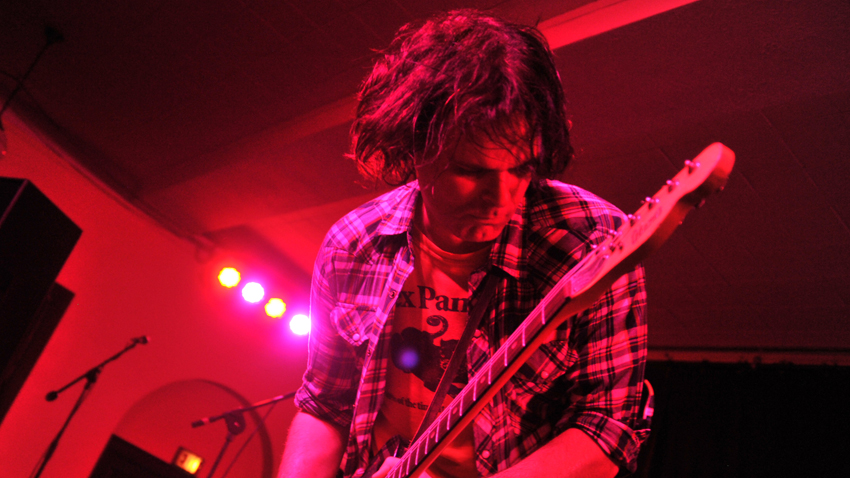
VIDEO: Local H's Scott Lucas on his unique guitar/bass setup
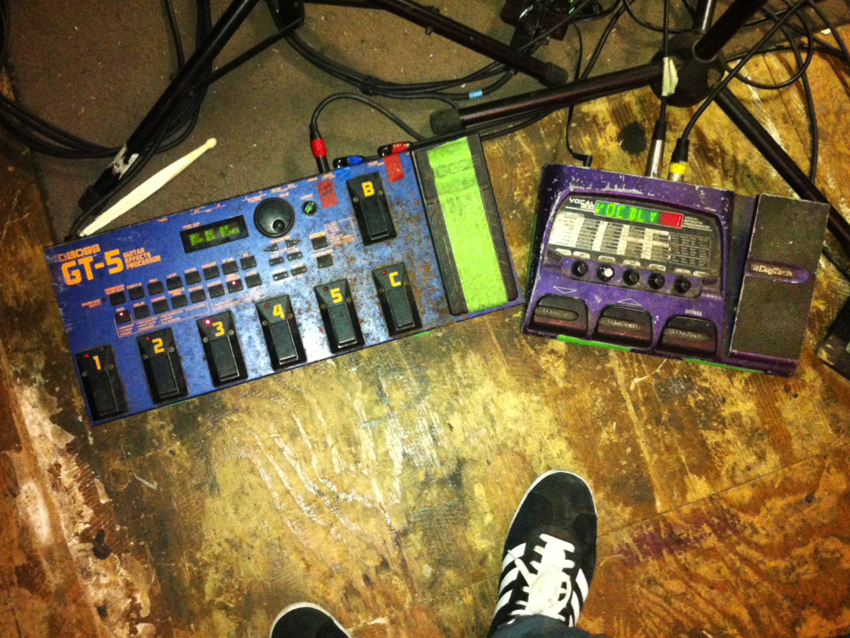
Scott Lucas' pedalboards, left side
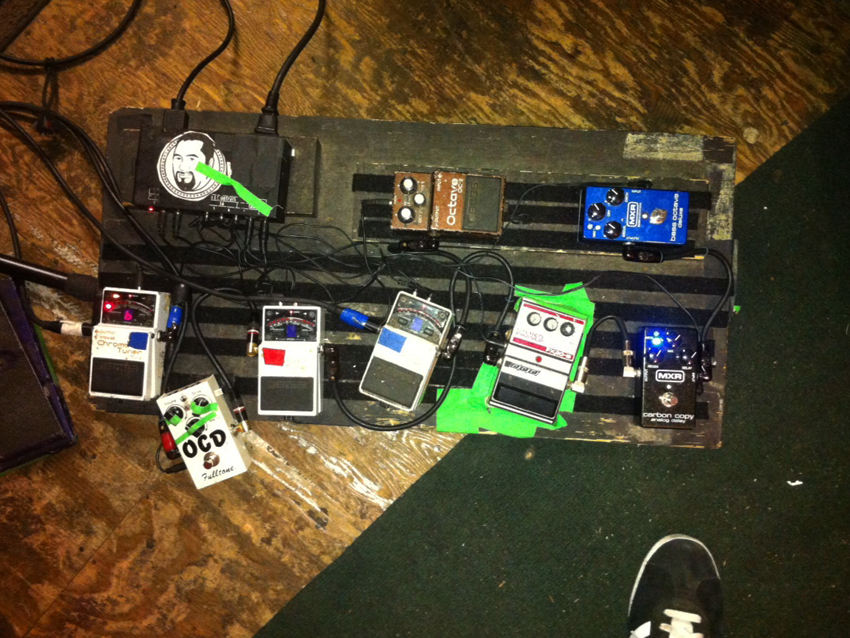
Scott Lucas' pedalboards, right side
Bottom row, left to right: Boss Chromatic Tuner used for switching the Matchless, OCD distortion pedal, Boss tuner used for switching the Vox, Boss tuner for switching the Ampeg, DOD phaser, MXR Carbon Copy delay.
Top row, left to right: Boss octave pedal for the bass pickup, MXR bass octave pedal.
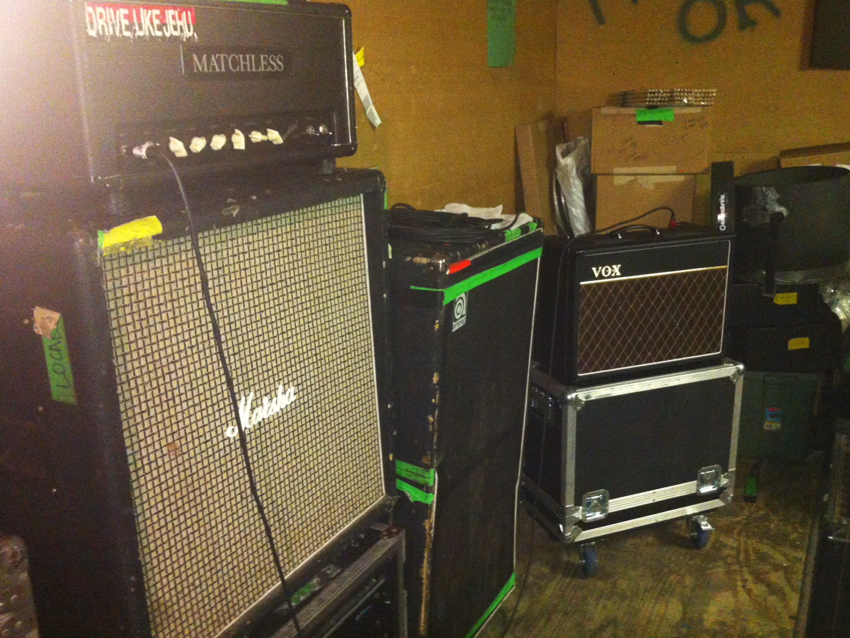
Scott Lucas' amp setup
Matchless 120 Super Chief, Marshall cabinet (two are used), Ampeg bass amp, Vox AC15 combo amp.
"You're the record company dude?" drummer Joe Daniels asked me. "Well, get in here and we'll blow you away!" Confidence, I thought - I like that. And with that, I followed Daniels inside a ratty rehearsal room in Zion, Illinois, where he and guitarist/bassist and singer Scott Lucas, in the fall of 1993, put on one of the most ginormous rock shows I'd ever seen.
At first, I was unsure whether a two-piece rock band could deliver the power that I had heard on their demo tape (in fact, the whole time they were playing, I kept looking around for a curtain that must have been hiding a secret third member). But all it took was four minutes and one song for me to be sold: here was the greatest find of my eight-year career as VP of A&R for Polydor Records (soon to be merged into Island).
Sure, there were doubters - even at my own label, some questioned whether a two-man band could truly cut it live. As was the case with myself, skeptics were routinely silenced within the first five minutes of a show. The band killed. A particular highlight was their appearance at Madison Square Garden in 1996, when they opened for the Stone Temple Pilots. Two men, one playing drums, the other playing a unique guitar/bass configuration, packing the kind of tectonic force of a four piece. Unreal.
In early 1999, I left Island Records, and shortly after, Daniels split the band - former Triple Fast Action drummer Brian St. Clair assumed the drummer's throne, where he remains to this day. Through the years, the band have released a handful of biting albums, and just last week, they've issued what could be their most blistering set yet, Hallelujah! I'm A Bum, a sprawling, adventurous double album, on which Lucas doesn't shy away from the touchy issue of politics currently consuming the US during the season leading up the presidential election.
MusicRadar caught up with Lucas to talk about the mechanics of playing bass and guitar at once, his thoughts on other two-piece bands, the influence of Nirvana and where he stands on the national debate. For the two of us, it was a reunion of sorts, one which was a long time in coming.
So Scott, before we get into bigger things, I wanted to mention a video I just saw. It was you appearing on Chic-a-Go-Go, a local Chicago public access children's show. (see below)
"Oh, it's a scene, man! They've been doing it for a while. I was actually pretty psyched and honored when they asked me to do it. I'm not really a fan of parents, but I love kids - and the sight of those kids jumping up and down to a song called They Saved Reagan's Brain was beyond perfect. Totally awesome."
Get the MusicRadar Newsletter
Want all the hottest music and gear news, reviews, deals, features and more, direct to your inbox? Sign up here.
Good job on the lip-syncing. The ukulele was a nice touch.
"Yeah, it's my girlfriend's. We rode our bikes over to the taping, and it was either the uke or my jumbo Gibson. Not much of a contest."
The two-man band setup - refresh my memory. How did it all come about?
"The band started as a four piece, and when the guitar player left, instead of replacing him, we just got heavier and louder. We just never bothered to replace the guy. Then when the bass player left for all kinds of crazy reasons, we were sort of stuck. You know, we're from Zion, so most of the people making music have mullets - that just wouldn't work. Some guy who's into playing Megadeth songs wasn't going to fit in.
"We were starting to get attention and labels were paying attention, so we just scrambled to do it as a two piece. I'd seen the Chickasaw Mudd Puppies and Flat Duo Jets and The Spinanes, so I knew it could be done. The trick was to do it in a real heavy rock setting, because most two-piece bands are blues based - and still are to this day. We wanted to be heavy but be two people."
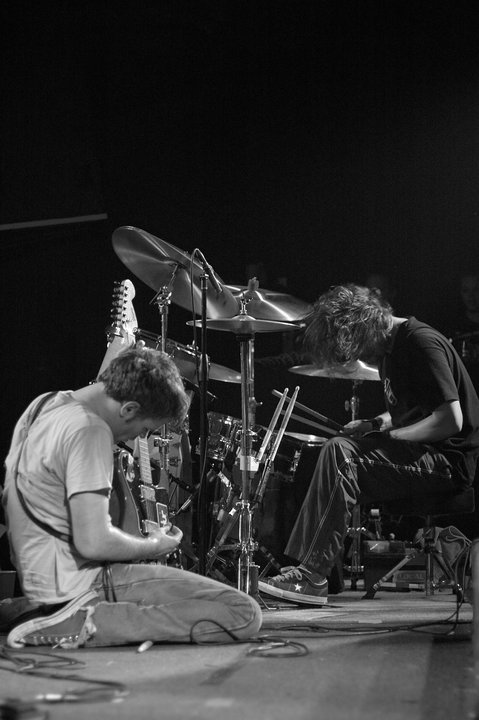
Bound for the floor: Lucas brings it along with drummer Brian St. Clair. © Matt Birnhanzel
What kind of trial and error was involved with setting up your guitar to also serve as the bass?
"Actually, there's still trial and error. I know there's things I can do to get this setup to sound even better than it does now. The goal has always been to make it sound like there's four people in the band. I'm always trying new effects and figuring out ways to split the signal.
"Originally, the idea was to split it through an octave pedal, but the problem was, there was no pedal that would work. If you played a chord, it would be too muddy. A friend of mine from Zion came up with the idea of isolating the signal of a couple of the strings, so that led to my putting a bass pickup on the guitar and having a separate jack come out - and that's what would go to a bass amp.
"You still couldn't put much of an octave on it. It didn't track well. I know octave pedals have gotten better, but it was pretty wobbly at the time. It was more about just cranking up the bass response on the Ampeg."
What were the first guitars you tried this out on?
"We didn't know the whole thing was going to work, so I bought a $150 Ibanez Telecaster copy. It had these lipstick pickups in it that sounded like Godzilla, it fed back like crazy, and I… I loved it! [Laughs] I started buying up all of these Ibanez lawsuit models. They were really cheap back then; now they're expensive.
"So it's those or Strats. The most versatile guitar I have is this Fender Stratocaster that I modified with SG pickups. It sounds great. I can do almost anything with that. I've been using the Strats for a long time, too. I always go back to them."
Do you ever feel as if you're compromising what you can play on stage? It's hard to re-create the records exactly as a two piece.
"On our first couple of records, we tried not to do too much because we knew we wouldn't be able to replicate them live. Maybe I'd overdub a solo here and there, but mostly we tried to record songs the way we'd do them live. Then on Pack Up The Cats, I was like, 'You know what? Fuck this. I'm just going to make the best record I can and worry about the rest later.' We had another guitar player with us for a while, but we eventually stopped with that.
"You just figure things out. There's certain songs that we do at soundcheck, but we only play them live when we know we can pull them off. But you don't want to hold back what you can do in the studio."
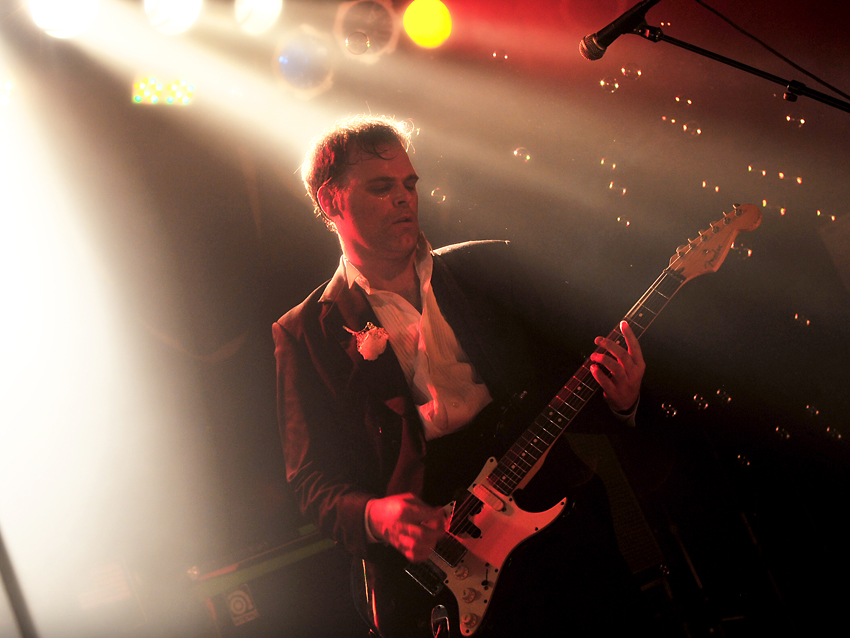
"The most versatile guitar I have is this Fender Stratocaster," says Lucas. © Wade Hawk
It's a little surprising that a guitar company hasn't approached you about building your own model, a signature series guitar.
[Laughs] "I don't know, that would be great! Pass them my number. Get the word out. I'll entertain all offers."
When the band released the first record, yes, there were a couple of other two-piece groups, but none were in the mainstream. Then the White Stripes hit, followed by the Black Keys. Do you feel as though you're not recognized for popularizing the approach?
"When I see bands like that doing well, it just makes me think, OK, it really was a good idea. And I've always had a special interest in two-piece bands, be they The White Stripes, Tenacious D or Death From Above. I'm automatically drawn to them. But I don't really feel like we popularized it. We didn't push it as much as the White Stripes did. We didn't market it so that it would register. We didn't want it to be a gimmick. Maybe the White Stripes were just smarter than us. [Laughs]
"I don't hear two-piece bands that sound like us. They sound more like the White Stripes. And the Black Keys, they're more like the Bad Company version of a two-piece band, whereas the White Stripes are the Led Zeppelin version."
So what does that make you?
"It makes us the MC5 version. [Laughs] The thing is, it's fun to do it this way. When I saw the Chickasaw Mudd Puppies years ago, I said to myself, 'We can do that. We can be entertaining and we don't need a bass player. We can rock the crowd just with two people.'"
When the first album came out, there were comparisons to Nirvana. That seemed to fade away after a few years, but at the time, how much did that bug you?
"It's kind of funny. At the time, I was thinking about Aerosmith a lot. I remember when they came out, everybody was calling them the poor man's Rolling Stones. And what was that based on - that Steven Tyler has big lips? [Laughs] I mean, nobody says that about Aerosmith anymore. That only lasted a little while. So I just thought, If we keep going, if we keep our heads down and make great records, that kind of shit will fall away. And it did. I was really dedicated to the idea that people would see us for what we were.
"I remember being asked about Nirvana at the time, and you know, I would say, 'I don't know. I never listen to them.' But then you get to a point where you can wear your influences comfortably, where you can say, 'Sure, I love Nirvana.' I mean, of course they made a difference. We never would have gotten signed if it weren't for Nirvana. A lot of bands could say the same thing. Nirvana created this huge need for loud, melodic, heavy rock. We just didn't want to be lumped in with all the shitty bands that sounded like them." [Laughs]
What's with making a double album? Didn't you get the memo that bands make singles and EPs nowadays?
"Yeah, well, I'm still working on my Led Zeppelin plan. I think we're at the Physical Graffiti phase now, which means we're due a double album. I knew I was going to get to the point where I deserved this, so I was going to take it. I like the idea of bands putting out singles and EPs every few months. I'd like to see more of that. I don't know if we're that kind of band, though. We're an album band. I'm a Pink Floyd freak, so I like concepts and themes."
There's a pretty strong political thread running through the album, yet it doesn't seem as though you're picking a particular side.
"I don't think anybody who has a brain would think that either side is perfect. For a long time, I thought that the right were crazy and the left were pussies. It's kind of like, 'Where do you go with that?' Based on some of the evidence I saw at the Democratic Convention, I'd say the left are growing some backbone and aren't a bunch of pussies anymore. I still think the right are a bunch of insane, crazy people. And that's their fault - they let themselves get hijacked by a bunch of freaks."
It's good that the lyrics aren't too literal, though. When some artists do that, the songs don't age well.
"That was very important to me. Even so, there are certain sentiments in it, which meant that the record had to come out by November. I wanted it to come out right around now. It was a bit of a race. There's an immediacy to what I'm saying, but I wanted the record to still speak to people after the election was over. The thing is, a lot of those issues and the things I'm addressing, they never go away. There's a constant push-pull in the world. To me, the biggest thing on the record is to not give in to cynicism.
"That is political in the sense that there's plenty of people who make policies that affect how we live our lives. They make policies that affect how we deal with one another, how we deal with our families - and that's the most personal thing in the world. Politics are extremely personal, and the idea that we can't talk about this is really damaging. Same goes with race. What goes on with politics and race are inextricably linked right now. I think a lot of people's problems with our current president have to do with race, and no one wants to admit it, and no one wants to talk about it."
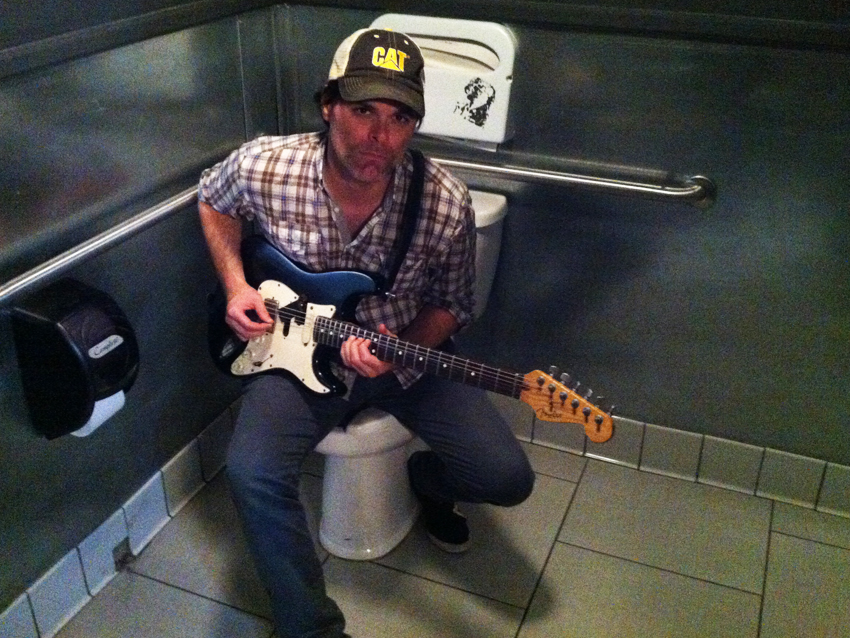
"There's still trial and error," Lucas says of his guitar/bass setup. "Everything is up for review." © Brian St. Clair
I'm going to veer radically and ask you some more about your guitars.
[Laughs] "Good."
How many guitars do you travel with that are set up to function as both bass and guitar?
"I travel with three that are set up that way. I have one guitar that I use for the Married Men [Lucas' side project, Scott Lucas And The Married Men], and it's a really nice guitar - a Gibson ES-335. I didn't want to maim that guitar. But every other guitar is set up with the bass pickups and the separate jack and all that. If I can get through one show with just one guitar, it's going to be the Strat. It's the one that's the most versatile. I usually can't make it through a show with one guitar, though - I usually break a string. So sometimes I switch to the Tele Ibanez guitar."
The amp combination is still evolving?
"Everything is always up for review. What I've come up with now is the split of the bottom two strings that goes into the Ampeg bass amp. The guitar goes into two amps, a Vox AC15 combo amp and the Matchless 120 Super Chief, and that's split into two Marshall cabs put on either side of the stage. It's taken me a while to get to this point. It's sounding good, but it might sound better. There's always hope."
Joe is a freelance journalist who has, over the past few decades, interviewed hundreds of guitarists for Guitar World, Guitar Player, MusicRadar and Classic Rock. He is also a former editor of Guitar World, contributing writer for Guitar Aficionado and VP of A&R for Island Records. He’s an enthusiastic guitarist, but he’s nowhere near the likes of the people he interviews. Surprisingly, his skills are more suited to the drums. If you need a drummer for your Beatles tribute band, look him up.
“I really thought I was going to die... and it absolutely was so freeing”: Blink 182’s Mark Hoppus talks surviving cancer and his band’s resurrection
"I remember showing up at 10 or 11 in the morning and working on solos and that leading to two or three o’clock in the morning the next day”: How Metallica beat the clock and battled fatigue to create a poignant and pulverising anti-war epic










